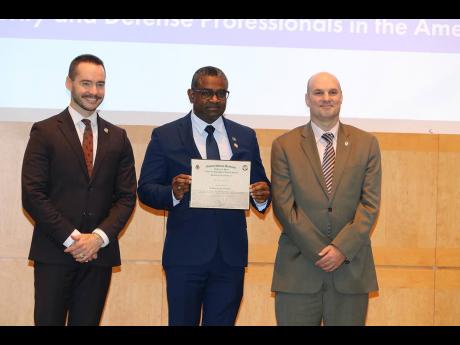Caribbean nations unite to combat regional security threats
Jamaicans among Caribbean graduates of William J. Perry Centre for Hemispheric Defence Studies
WASHINGTON, DC:
In a region where a wave of collaborative security expertise is emerging, ten Jamaicans were among 35 Caribbean law enforcement professionals who graduated on Friday, May 16 from the prestigious Caribbean Security and Defence course offered by the William J. Perry Centre for Hemispheric Defence Studies in Washington, DC, signalling a unified approach to tackling the region’s most pressing security challenges.
“As a Caricom State we have too many silos,” remarked Acting Senior Superintendent of Police, Victor Barrett of Jamaica’s Counter-Terrorism and Organised Crime Investigation Branch, who spoke on behalf of his country’s contingent.
“But on this course for the past two weeks, we saw where as a Caribbean community we move closer together as a body, and as a body unity is strength.”
The four-week programme – split between distance learning and in-residence training – serves as the Perry Centre’s cornerstone educational offering for English-speaking Caribbean nations.
It delivers a comprehensive curriculum spanning defence governance, transnational threats, human rights, disaster response, and cybersecurity challenges that plague the region’s interconnected shores.
The programme’s methodology blends theoretical frameworks with practical applications, requiring participants to develop individualised action plans targeting specific security challenges in their home organisations. This approach bridges the gap between global security trends, U.S. policy considerations, and Caribbean regional best practices.
The course is implemented using a mixed methodology of readings, lectures, group discussions, and field visits. A key element is the development of individualised action plans developed by participants, focusing on one or more of the course themes, with an eye to being implemented in their home organisations.
Beyond the classroom walls, the course aims to forge crucial personal connections that may prove more valuable than the formal education itself. “Definitely, and the important thing is that we form alliances, so we have a point of contact in different regions,” Barrett explained.
“There is significant collaboration between the Caribbean Community Implementation Agency for Crime and Security in Belize, the Regional Security System and the Transnational Organised Crime Task Force, so if we have an issue in neighbouring states, we know who to call.” These professional networks, Barrett emphasised, could prove invaluable during cross-border operations.
SPECIAL RECOGNITION
The Jamaican delegation, comprising members from the Jamaica Defence Force (JDF), the Major Organised Crime Anti-Corruption Agency (MOCA), and the Jamaica Constabulary Force (JCF), joined counterparts from nine other nations including Barbados, Belize, Dominica, Grenada, Guyana, St Lucia, St Vincent and the Grenadines, Suriname, and Trinidad and Tobago.
For a region grappling with sophisticated criminal enterprises that exploit geographical fragmentation, the timing couldn’t be more critical. Participants received specialised training in combating transnational crime, cybercrime, illicit firearms trafficking, human trafficking, and counterfeiting – all pressing concerns in Caribbean nations where criminal organisations increasingly operate across borders.
“In this modern world, where crime has many faces, we are well prepared,” Barrett insisted. “I do not think, but I know, we all possess the capacity to do our country good.”
Four Jamaicans received special recognition for outstanding presentations during the course. They are Lt Colonel Maxwell Gordon of the JDF; Rhoan Barker of CARICOM IMPACS, Pauline Powell, MOCA and Joanna Collen, JCF. Their achievements reflect the Perry Centre’s mission to function as “a trusted agent uniquely positioned to convene the leading network of security and defence practitioners in the Americas.”
Whether this newly minted cadre of security professionals can translate their Washington education into tangible security improvements remains to be seen.
Acting SSP Barrett however, struck an optimistic tone regarding implementation of these newly acquired strategies: “This exposure will allow us to better focus on the criminal networks in the region. Our Commissioner of Police, Dr. Kevin Blake has given us a mandate, focusing on the deterrent strategy, and what we learn here today will bolster our efforts to continue this fight.”
As Caribbean nations confront evolving security threats with limited resources, this cross-border professional development initiative represents a critical acknowledgement that in matters of regional security, isolation is not an option. The region’s criminal elements have already mastered collaboration across borders – now its defenders must continue to learn to do the same.



